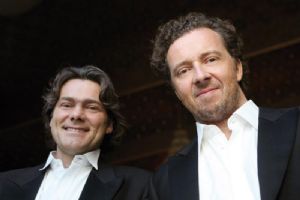Florence is not the only major city in Europe that has struggled to keep its theatres houses open. Funding cuts and globalization have together threatened theatres across the continent, from the United Kingdom to Spain. While a number of Italy’s historic theatres have closed (or worse, been demolished) over the last few years, the city of Florence can be proud of one recent success story: saving the Pergola theatre, Italy’s oldest opera house. Sheela Raman tells us who stepped in to rescue it from demise.
Those who love classical music in Florence held their breath over the past year during talk of closing the Teatro della Pergola. What would this city be without the modern and classical theatre productions the Pergola offers, as well as the Amici della Musica concert season? What would become of the space itself, the oldest opera house in Italy (commissioned in 1651 by Cardinal Giancarlo de’ Medici and designed by architect Ferdinando Tacca), and the first to be built in true Italian style, with rising tiers of boxes replacing the old Roman semicircular seating? It has been agonizing to imagine the frescoes and sumptuous red curtains of this theatre being stripped away and the backstage dressing rooms of the artists, which are actually formed from remains of the city’s seventeeth-century streets, demolished. And it was disturbing to think about the void that would be felt if the artistic life of the Pergola were to go silent after centuries of illustrious performances.
Fortunately, we have been relieved of these fears. This fall marks the first season of the Fondazione Teatro della Pergola, an organization initiated by Florence mayor Matteo Renzi and the Pergola’s managing director, Marco Giorgetti, with the support of the City and the bank, Ente Cassa di Risparmio di Firenze. Renzi is the chairman of the new foundation, which consists of five members representing both the City and the bank. Considering the grave financial risk the Pergola was under last year, it is noteworthy that the City has found a solution to the problem without a day of interrupted performances. We can largely credit the salvaging of the theatre to Renzi’s will to preserve a theatrical stronghold in Florence, Giorgetti’s motivation to structurally restore the theatre and keep it physically viable, and, crucially, Ente Cassa for the investment of financial resources.
Giorgetti has been managing director of the Pergola since 2007, when he left his post as general manager of the Ente Teatrale Italiano. After four years of gestation, his goal of reviving and restoring the Pergola has finally been realized. After restoration was completed, the actual transfer of the Pergola property to the City occurred in January 2011, along with a transfer of funds to the Pergola from those made available for the Contemporary Art Center of Florence.
By July the foundation was fully formed, with the cooperation of Ente Cassa, and a program set for the fall. On October 18, the Fondazione met to open the 2011-2012 season.
Knowing that the Pergola will remain one of Florence’s jewels, we can now concentrate on the offerings for the season. Under the artistic direction of Maurizio Scappari, the Pergola has pulled in international talent for its inaugural series, Italian Theatre in the World, which celebrates the 150th anniversary of the unification of Italy and the preservation of the theatre tradition in Florence. In Discovering Pasolini, which ran from October 28 to the 30, the MaMa theatre company, an acclaimed off-Broadway theatre group, collaborated with Italian actors and actresses to retell the life of Pier Paolo Pasolini (see TF 73 for his biography)-a production which entailed also a revisiting of his films. Another collaboration with MaMa will follow on the December 18, a play entitled Eleonora ultima notte di Pittsburgh, about the final days of famed actress Eleonora Duse (see TF 139 for her biography). Uniting emerging and established talents is another goal of the new Pergola, and it is through a conscious effort to promote young performers that many of this year’s productions feature up-and-coming actors working with seasoned ones.
As movie theatres, small playhouses, and large theatres like the Pergola continue to close throughout Italy, we must be grateful that Florence has had the sense to invest in the Pergola and keep its repertoire innovative. Weathering the economic crisis becomes more bearable when cultural traditions and long-standing rituals are maintained. Even the thought that one can, on occasion, venture into the intimate, storied space of the Pergola and escape into an artfully designed theatrical world, or sit down to hear an exquisite chamber music concert, is a great comfort. Even while resources are scarce, we can still take pride in a long and continually evolving tradition of artistic achievement.
In the words of Renzi, ‘Bologna has seen the closing of the Teatro Duse, and the Teatro Valle in Rome has suspended operations. In Florence, the Pergola is saved and has a future ahead of it … We maintain that the Teatro della Pergola is a beating heart in the historic circuit of our city.’
For the full calendar of the 2011-2012 concert season at the Pergola Theatre, see the Amici della Musica website at www.amicimusica.fi.it or call 055/609012.






